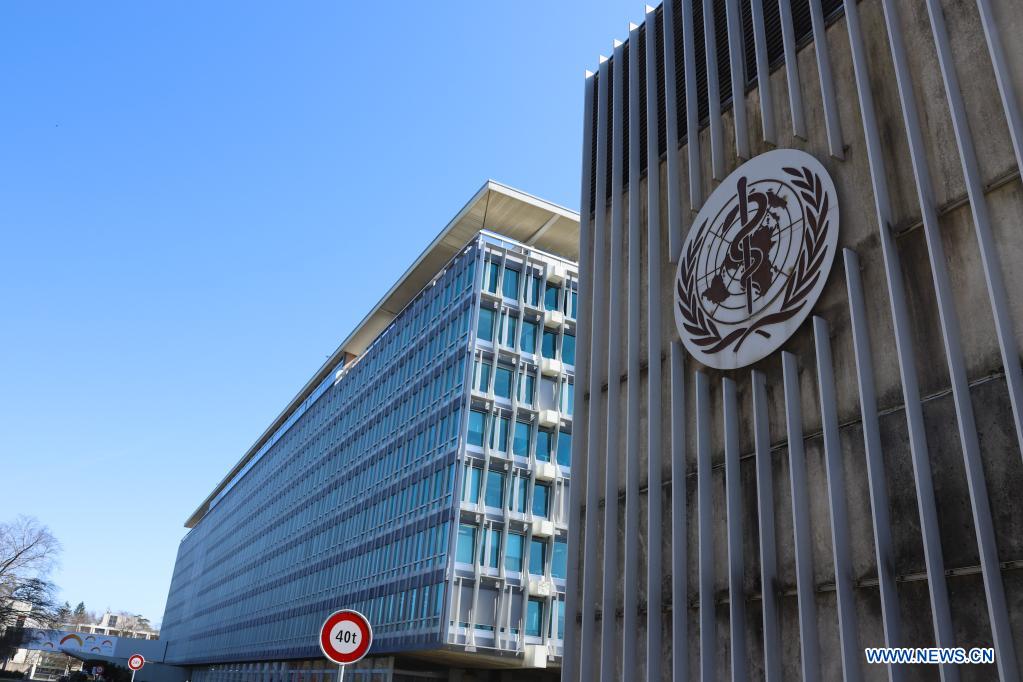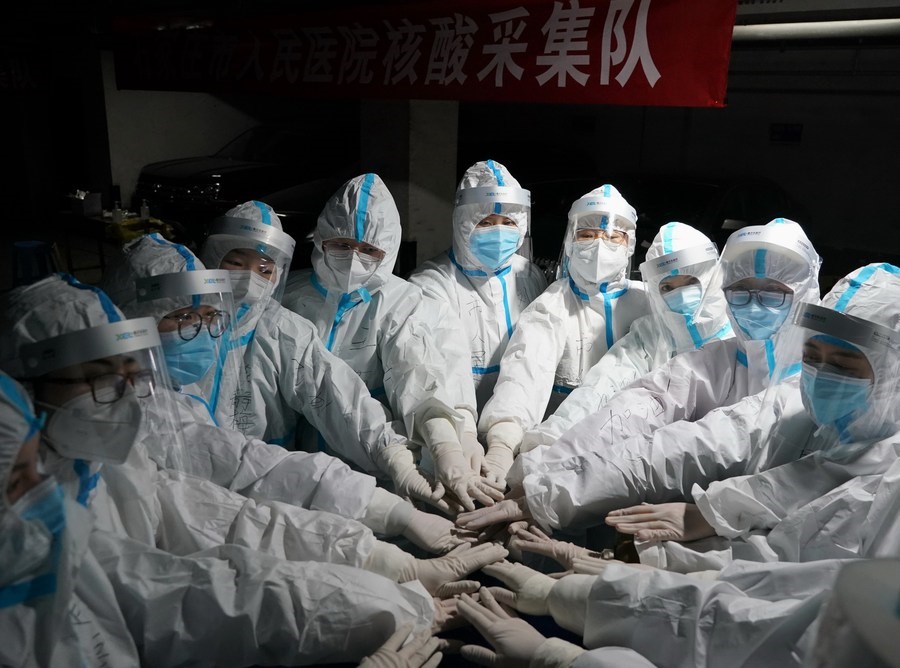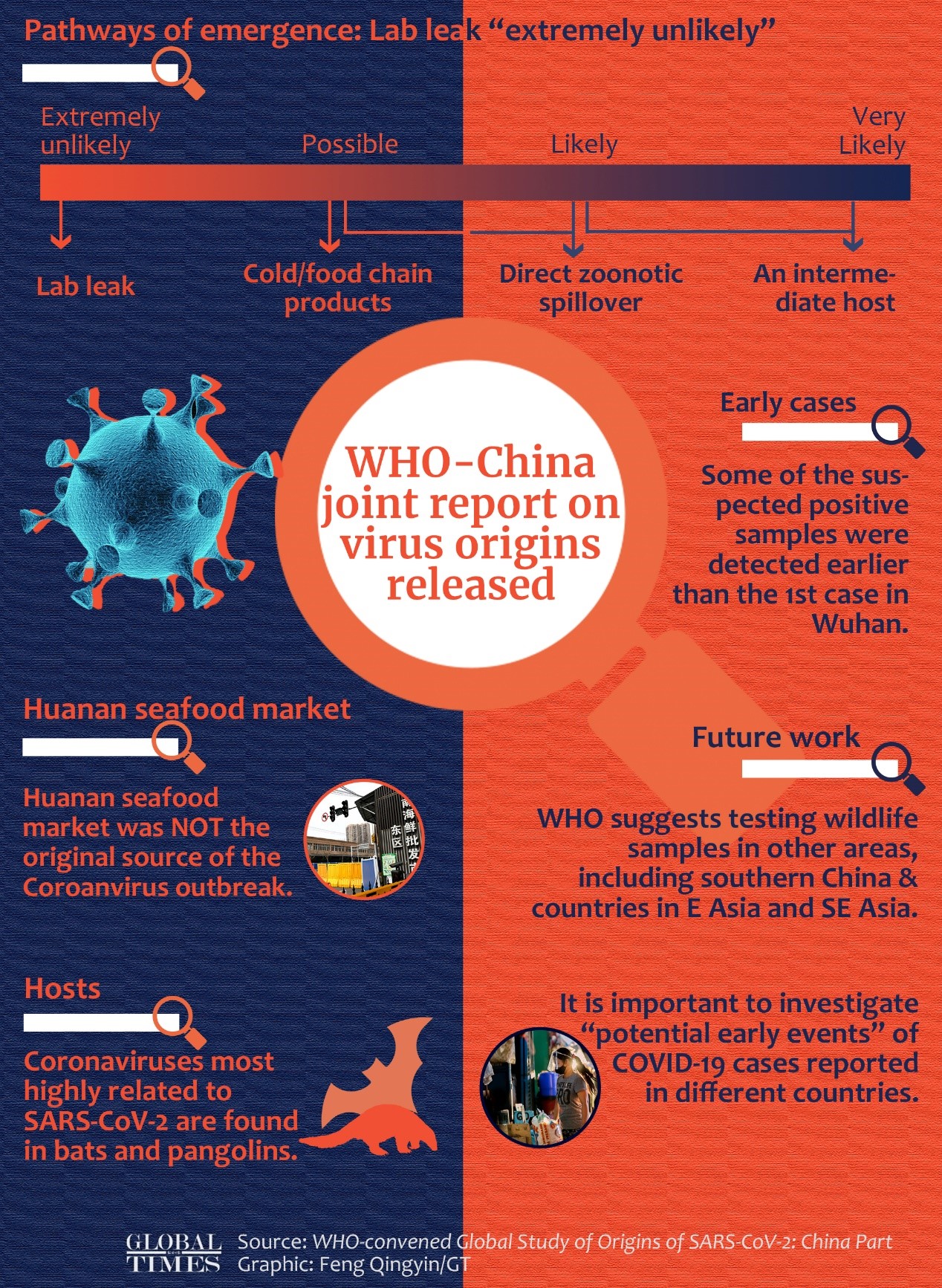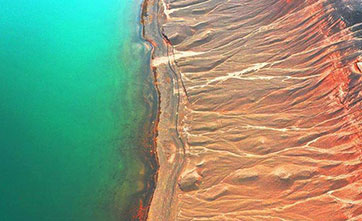Tracing COVID-19's origins: politics should not outweigh science

Photo taken on March 30, 2021 shows an exterior view of the headquarters of the World Health Organization (WHO) in Geneva, Switzerland. The WHO released a report on Tuesday following a joint study with China on the global tracing of COVID-19 origins. (Xinhua/Chen Junxia)
The World Health Organization (WHO) released a report Tuesday on the global tracing of COVID-19 origins, dismissing the "lab leak" conspiracy theory, which had been deliberately promoted by Western media and politicians. Will Western media and politicians ever stop slandering China on the origins of the novel coronavirus?
For Western media and politicians, tracing the origins of COVID-19 has always been a political issue, not a scientific one. To divert the mounting pressure over coronavirus mishandling within their own nation, U.S. politicians deliberately called coronavirus "Chinese virus" or "Wuhan virus". They publicly endorsed the malicious hypothesis that claimed the virus had been leaked from a Wuhan lab, without any evidence to back it up.
Being accustomed to politicizing the pandemic for their interests, how will Western media and politicians acknowledge and respect the result of the scientific research and clear China's name?
Cherry picking to shape the narrative
The official report, which didn't tally with Western "concerns", ruled out the lab-leak hypothesis and suggested the "possibility of missed circulation in other countries." This report did not satisfy Western media's and politicians' need to demonize China's role in the pandemic. However, as a veteran of manipulating narratives, the West is always capable of distorting reports.
Western media uniformly ignored the scientific conclusion and barely mentioned the details of the report. Instead, they made a fuss over a few sentences, pulling them out of context to mislead their audience. Not surprisingly, Western media played up the WHO's calls for further investigation, implying that China had manipulated the result.
Such reports are just the result of cherry-picking that covered up the crucial message - that experts suggested conducting further research worldwide. At the same time, the Western media deliberately deleted the word "worldwide" from their articles, arbitrarily limiting the additional research scale to China alone.
According to the report, the possibility of a "lab leak" was considered to be extremely unlikely. To increase their knowledge of the matter, "regular administrative and internal reviews of high-level biosafety laboratories were carried out worldwide." However, this sentence was then used as evidence of the possibility of a "lab-leak" as all reports twisted it to mean more research is needed in Chinese labs.
"The expert team offered a long list of recommendations for additional research…But it is unclear whether China, which repeatedly hindered the W.H.O inquiry, will cooperate," said an article in New York Times, without mentioning that the recommendations should be carried out on a global level. It is easy to use such a bewildering sentence to hook the audience to their already-set narratives, implying that the joint research is not extensive enough, and China refused to cooperate to carry out more research.
In the report, WHO experts did mention that further research is needed, but across the globe. They called for "conducting further retrospective and systematic research around earlier cases and possible hosts for SARS-CoV-2 around the world." Contradictory to the Western media's narrative, China was the first country to cooperate with the WHO and conduct a joint study on the origins of COVID-19.

Medical workers get together in a huddle before conducting COVID-19 tests at a community in Yuhua District of Shijiazhuang, capital of north China's Hebei Province, Jan. 7, 2021. (Xinhua/Yang Shiyao)
Smearing report's transparency
Ever since China and WHO started their origin tracing mission, Western media and politicians have never stopped firing torrents of unfair criticism to undermine the credibility of the report. Most of these untenable accusations are centered around the issue of transparency, slandering China for not handing over crucial data.
On February 12, the New York Times published an article titled "On W.H.O. Trip, China refused to hand over Important Data," which cites some experts in interviews as implying that China hindered the research. The lie was ruthlessly smashed by the interviewed experts, who criticized the article for twisting their conversations.
"This was NOT my experience on @WHO mission. As lead of animal/environment working group, I found trust &openness w/ my China counterparts. We DID get access to critical new data throughout. We DID increase our understanding of likely spillover pathways," wrote Peter Daszak, one of the interviewed experts on Twitter. Another interviewed expert, Thea K Fischer, also forwarded Peter's tweet to express her discontent over the article.
Peter said the Western media had "selectively misquoted to fit the narrative prescribed before the work began". But it is not just media that use such tactics. Western politicians do too.
On March 30, the US conspired with other Western countries to issue a joint statement expressing "concerns" about the report, repeating the claim that critical data could not be accessed. The statement blatantly ignored the facts and scientific arguments, and only exposed Western countries' eagerness to defame the report, after it failed to reach the conclusion they were looking for.
Facts will brush aside the West's false allegations over transparency, according to Liang Wannian, a team leader of the Chinese side of the WHO-China joint expert team on March 31, WHO experts were granted the same data access as their Chinese counterparts in generating this report. Marion Koopmans, a Dutch virologist in the research team that came to China, told NPR that she believed her access was sufficient.
"We've seen a lot of information. We've been given a lot of information. We've had access to the people working on the data, aggregating the data, looking at what exact questionnaires that they used, what does the data file look like. To me, that is quite extensive data access," she said.
Based on Western logic, any argument, even a scientific one, that doesn't fit preset narratives is manipulated by China. It is pathetic for the West to put politics over science in a way that exploits every possible approach, even one that abandons their scientific principles, to politicize the pandemic. The study of origins is a global mission that should be conducted in multiple countries and localities. It should never be used as a political tool.
If the West really cared about the origins of the virus as it claims, then it should cooperate closely with WHO experts in a scientific, open, transparent, and responsible manner as China has done, not immerse itself in the blame game.

Highlights from WHO-China joint report on coronavirus origins: A lab leak was "extremely unlikely"; Huanan seafood market was NOT the original source of the outbreak; It's important to investigate "potential early events" of COVID-19 cases in different countries. Graphic: Feng Qingyin/GT
Photos
Related Stories
Copyright © 2021 People's Daily Online. All Rights Reserved.










